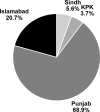Medical students' attitudes toward AI in education: perception, effectiveness, and its credibility
- PMID: 39833834
- PMCID: PMC11744861
- DOI: 10.1186/s12909-025-06704-y
Medical students' attitudes toward AI in education: perception, effectiveness, and its credibility
Abstract
Background: The rapid advancement of artificial intelligence (AI) has revolutionized both medical education and healthcare by delivering innovative tools that enhance learning and improve overall outcomes. The study aimed to assess students' perceptions regarding the credibility and effectiveness of AI as a learning tool and to explore the dynamics of integrating AI in medical education.
Methodology: A cross-sectional study was carried out across medical colleges in Pakistan. A 26-question survey was developed using Google Forms from previously validated studies. The survey assessed demographics of participants, basic understanding of AI, AI as a learning tool in medical education and socio-ethical impacts of the use of AI. The data was analyzed using SPSS (v 26.0) to derive descriptive and inferential statistics.
Result: A total of 702 medical students aged 18 to 26 years (mean age 20.50 ± 1.6 years) participated in the study. The findings revealed a generally favorable attitude towards AI among medical students (80.3%), with the majority considering it an effective (60.8%) and credible (58.4%) learning tool in medical education. Students agreed that AI learning optimized their study time (60.3%) and provided up-to-date medical information (63.1%). Notably, 65.7% of students found AI more efficient in helping them grasp medical concepts compared to traditional tools like books and lectures, while 66.8% reported receiving more accurate answers to their medical inquiries through AI. The study highlighted that medical students view traditional tools as becoming increasingly outdated (59%), emphasizing the importance of integrating AI into medical education and creating dedicated AI tools (80%) for the medical education.
Conclusion: This study demonstrated that AI is an effective and credible tool in medical education, offering personalized learning experiences and improved educational outcomes. AI tools are helping students learn medical concepts by cutting down on study-time, providing accurate answers, and ultimately improving study outcomes. We recommend developing dedicated AI tools for medical education and their formal integration into medical curricula, along with appropriate regulatory oversight to ensure AI can enhance human abilities rather than acting as a replacement for humans.
Keywords: Artificial intelligence; Deep learning; Educational technology: healthcare; Machine learning; Medical education.
© 2025. The Author(s).
Conflict of interest statement
Human ethics and consent to participate: Ethical approval was obtained from the Ethics Review Committee of NUST School of Health Sciences (NSHS), National University of Sciences and Technology, Islamabad, Pakistan. The first page of the questionnaire contained a consent form that all participants were required to complete to proceed further. Respondents were informed about the nature and purpose of the survey before providing consent, and they were given the option to withdraw at any time. Competing interests: The authors declare no competing interests.
Figures
References
-
- Topol E. High-performance medicine: the convergence of human and artificial intelligence. Nat Med. 2019;25(1):44–56. 10.1038/s41591-018-0300-7. - PubMed
-
- Salahuddin S, Zehra U ul B., Sajwani khadeejah, Lak MA, Ejaz A, Riaz F, Hussain N, Lodhi W. Preferred learning style of undergraduate medical students at shalamar medical and dental college; A Descriptive Study. Avicenna J Health Sci. 2024, 1, 16–20.
MeSH terms
LinkOut - more resources
Full Text Sources





